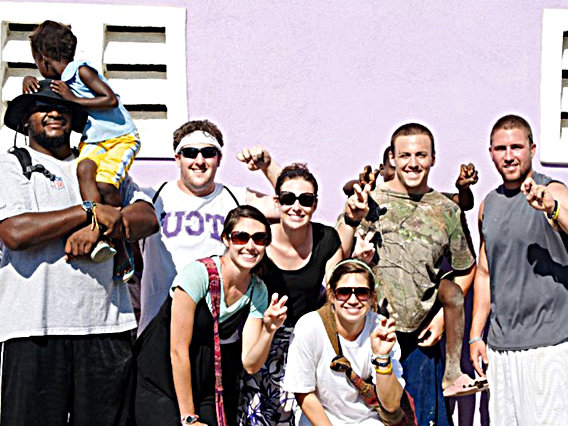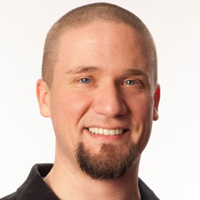Marshall Newhouse represented the biggest of teddy bears. He's got an easy way about him, and at 6 feet, 4 inches and 319 pounds, he's unlike anyone the kids in Haiti had ever seen.
Bright-eyed, they tugged his shorts, touched his legs. Was he real? They wanted to be held. They climbed his arms and shoulders, laughed and smiled.
Titanyen, Haiti, should be no home for such unbridled joy, such easy love. This is the Valley of Death, a town long used as the burial site of dictatorial murder squads. Then, following a massive earthquake on January 12, 2010, uncounted thousands of victims were buried en masse in ditches in the town about 17 miles from the Haitian capital of Port-au- Prince.
Hauled in dump trucks, no one knew who they were, where they came from. The substantial death and destruction led to a cholera outbreak that killed thousands more.
Not much had changed when Newhouse visited on a mission trip in May 2011. Despite millions of dollars of aid that flowed in following the earthquake, the country remains crippled by illness and poverty.
Yet the children smile. In a country where the median age of the population is just over 20 years old, many have no parents, no older siblings or relatives. Yet they love, needing only the simple joy of human contact.
"They'd see you and they'd just want some affection. They'd want to see you smile," Newhouse said, his eyes softening. "They'd want you to pick 'em up and show them some attention. Day to day for them it's 'What am I going to eat? Can I get clean? Maybe, but most likely not. Can I keep from getting yellow fever or something?' Then seeing people come through whether they're white, black or indifferent and having that tactile, that physical presence, it brings a lot of joy for them definitely."
"A piece of my heart"
Following the Green Bay Packers 2010 Super Bowl championship season, the owners of the National Football League locked out their players in a contentious labor dispute. Like so many of his teammates, Newhouse took the time away from the game to reconnect with family and friends – but he wanted to give back as well.
A former roommate at Texas Christian University suggested he come along on a mission trip to Haiti. He gladly accepted, looking not only to serve his faith but to take himself out of his comfort zone.
He arrived in Port-au- Prince and was overwhelmed by a crush of chaos leaving the airport. Cars, motorcycles and buses pushed through the choked streets, honking at one another, cyclists and pedestrians. The physical aftermath of the earthquake remained, piles of garbage and rubble a pock on the capital city.
People rushed the visitors, some curious, some selling wares. Newhouse was prepped for this, but reality outdistanced anything he could've read, watched or heard.
"There's still people on the street with no jobs, there's just trash lining the street," he said. "There are people who were selling goods but there's no one to buy those goods. There's no one who has money to buy those goods. We saw that the entire way. Then of course you get to the tent cities, miles and miles and endless, endless tent cities. You're like..."
He stopped talking, and his eyes shot to the ceiling. Looking for the words, Newhouse could only sigh. After a brief pause, he continued.
"Even our homeless in America, it seems like they are living a somewhat lavish lifestyle because they're getting homeless shelter. It's just like wow, these people live in this day to day."
Such abject poverty, such proximity to death, could break your heart and your spirit. Yet the people of this country who are so routinely beaten back by natural disasters and an inept government don't allow for it.
Those who visit aren't broken by the experience, because the Haitians aren't.
Newhouse went to Titanyen with a Mission of Hope group to provide a spiritual and physical uplift, yet the children and a visit to church services showed him that the Haitian people, who have experienced so much pain, had already found it.
Slacks, collared shirts, ties and dresses - whatever the Sunday best could be - were broken out. Worship, often conducted in Creole, is jubilant, masses punctuated with song and dance. And the smiles. They never seem to dampen. Joy was always present.
"I was listening to it and it was all in Creole and I wasn't exactly sure what they were saying but there was a vibrancy and absolute excitement about everyone in this place," Newhouse said. "I was like man, we've got it all wrong over here. I feel we've got it all wrong. For us it's like oh, I've got to get up and go and for them it's like I get to go and worship."
Like so many others who have traveled there, Newhouse wants to return. His professional demands will push back his next trip a bit, but he has developed a permanent connection with the tiny island in the Caribbean.
"You feel like you left a piece of your heart there," he said. "It's something that definitely draws you back. There's a couple kids I correspond with still just occasionally. It's definitely a place that's dear to me now."
Samuel Dalembert walked down the buffet table in the player's lounge at the Cousins Center, pulling back each silver hood to look at and smell the day's lunch. Eleven years and over $75 million into his career in the NBA, and the 31-year-old Haitian native still savors every sense of a meal.
Finally picking up a plate, he took a piece of salmon and vegetables, smiling. Sitting down at a small circular table, he bowed his head.
After all these years, the Milwaukee Bucks center has much to be thankful for. He also has so much yet to do.
"I feel it's basically my destiny to really make a difference," he said.
Raised by his grandmother in Port-au-Prince until he was a teen, he moved to Canada, then New Jersey before earning a scholarship to Seton Hall University. After two years, he was drafted in the first round by the Philadelphia 76ers.
As the first Haitian born player to make the NBA, he has become an unofficial ambassador for his homeland. He had worked for years to increase awareness about its plight, but the earthquake brought Haiti into a global spotlight. It happened in January, the heart of the NBA season, yet Dalembert exhausted himself flying back and forth from Haiti to Philadelphia, even taking a redeye on a cargo plane to help.
He poured his money out, as people and organizations following the disaster did by the millions.
Dalembert shakes his head as he picks at the salmon. The money, all given in good faith, hasn't netted the intended results. The capital building in Port-au-Prince, the National Palace, remains just pieces of what it once was. No hospital has been built. No new, solid homes for the displaced, either.
His easy smile fades quickly.
"The money is out there for the help. The thing about it is it's been dispersed to the wrong people over and over again," he said. "That's why you don't see it."
He drops his fork and leans back away from his lunch.
"I could've just done it like everybody else - I don't even care about it, just get it done. Then what happens? You find out things never get done, or get half done. You have to keep an eye on how the money's been spent."
He's seen first-hand what money can, or can't do, in Haiti. So, he created his own foundation, run by his own people, started with his own money. That was important – everyone would be known, and accountable.
Through the Dalembert Foundation he is developing the Dalembert Academic and Athletic Academy to give children much needed opportunities in the classroom and the release of athletics.
"I always believe there's more kids like myself out there who's dying to be discovered," he said. "To me, I feel like OK, well, if it's not me, my generation, who knows what generation is going to be able to make something happen. That's why I put myself out there so the level of failure is minimized."
True healing, true change, takes time. Especially in Haiti. The country has been trying to change, trying to heal itself, since it's independence from France in 1804. There has been so much blood spilled. There were the battles with its island neighbor, the Dominican Republic, and itself. Dictators long ran the country as their personal bank, its people their soldiers, and targets.
Time is all Dalembert needs now. It's all he asks for.
"My thing was it's very difficult to keep asking people for money, money, money," he said. "I tell people if you give me your time, I'll find a way to raise money. Sometimes the player comes in for three days, visits your country, and the kids are able to see that, put a clinic together, do some stuff like that. Or able to get a lot of players and put an all-star game and raise money. Those are huge. Those are not things where the player doesn't have to pull money out of his pocket. He's just got to utilize his talent."
Dalembert smiles broadly upon hearing Newhouse's lasting memories of his church visit. In the player's lounge, he drums the table and hums some beats, the vegetables on his plate popping in rhythm.
"Those are the souls of Haiti, that kind of music," he said. "That's why you see us back in church, that's why you see us always smiling, always happy. We're always joking around, because it's what keeps us forgetting where we are, it's what keeping us from (being) miserable and eventually not moving forward and living life, not living our life."
Even with the heavy emotional toll the struggles of his country have slung around his heart and mind, Dalembert's grin still comes easily. It's his – their – nature. It's also a testament to an indomitable spirit that defines the country and its people, while giving those who visit the same boundless hope for the future despite all indications there should be none.
Fulfilling a destiny
Joyous souls
Jim Owczarski is an award-winning sports journalist and comes to Milwaukee by way of the Chicago Sun-Times Media Network.
A three-year Wisconsin resident who has considered Milwaukee a second home for the better part of seven years, he brings to the market experience covering nearly all major and college sports.
To this point in his career, he has been awarded six national Associated Press Sports Editors awards for investigative reporting, feature writing, breaking news and projects. He is also a four-time nominee for the prestigious Peter J. Lisagor Awards for Exemplary Journalism, presented by the Chicago Headline Club, and is a two-time winner for Best Sports Story. He has also won numerous other Illinois Press Association, Illinois Associated Press and Northern Illinois Newspaper Association awards.
Jim's career started in earnest as a North Central College (Naperville, Ill.) senior in 2002 when he received a Richter Fellowship to cover the Chicago White Sox in spring training. He was hired by the Naperville Sun in 2003 and moved on to the Aurora Beacon News in 2007 before joining OnMilwaukee.com.
In that time, he has covered the events, news and personalities that make up the PGA Tour, LPGA Tour, Major League Baseball, the National Football League, the National Hockey League, NCAA football, baseball and men's and women's basketball as well as boxing, mixed martial arts and various U.S. Olympic teams.
Golf aficionados who venture into Illinois have also read Jim in GOLF Chicago Magazine as well as the Chicago District Golfer and Illinois Golfer magazines.



